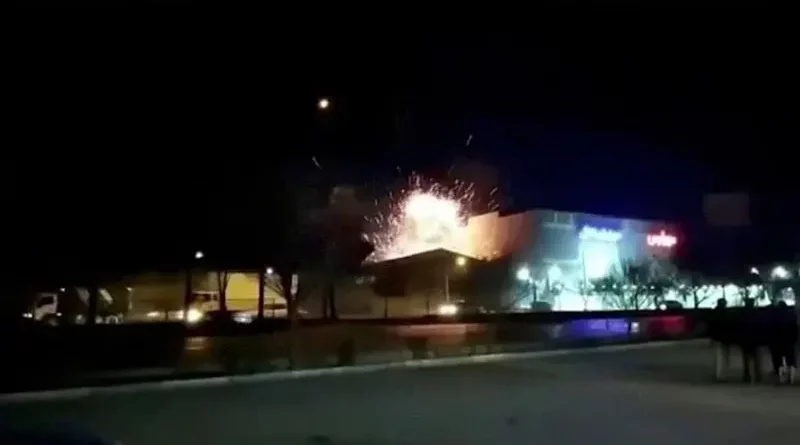Israel appears to have been behind drone strike on Iran factory: US official
DUBAI/WASHINGTON: Israel appears to have been behind an overnight drone attack on a military factory in Iran, a US official said on Sunday.
Iran claimed to have intercepted drones that struck a military industry target near the central city of Isfahan, and said there were no casualties or serious damage.
The extent of damage could not be independently ascertained. Iranian state media released footage showing a flash in the sky and emergency vehicles at the scene.
A spokesperson for the Israeli military declined to comment. Arch-foe Israel has long said it is willing to strike Iranian targets if diplomacy fails to curb Tehran’s nuclear or missile programmes, but it has a policy of withholding comment on specific incidents.
Pentagon spokesperson Brigadier General Patrick Ryder said no US military forces were involved in strikes in Iran, but declined to comment further.
That US officials were pointing to an Israeli role in the attack was first reported by the Wall Street Journal, citing several unidentified sources. One US official, speaking on condition of anonymity, told Reuters it did appear that Israel was involved. Several other US officials declined to comment, beyond saying that Washington played no role.
Tehran did not formally ascribe blame for what Foreign Minister Hossein Amirabdollahian called a “cowardly” attack aimed at creating “insecurity” in Iran. But state TV broadcast comments by a lawmaker, Hossein Mirzaie, saying there was “strong speculation” Israel was behind it.
The attack came amid tension between Iran and the West over Tehran’s nuclear activity and its supply of arms — including long-range “suicide drones” — for Russia’s war in Ukraine, and months of anti-government demonstrations at home.
The extent of the damage could not be independently confirmed. Iran’s Defence Ministry said the explosion caused only minor damage and no casualties.
“Such actions will not impact our experts’ determination to progress in our peaceful nuclear work,” Amirabdollahian told reporters in televised remarks.
An Israeli strike on Iran would be the first under Prime Minister Benjamin Netanyahu since he returned to office last month at the helm of the most right-wing government in Israeli history.
In Ukraine, which accuses Iran of supplying hundreds of drones to Russia to attack civilian targets in Ukrainian cities far from the front, a senior aide to President Volodymyr Zelenskiy linked the incident directly to the war there.
“Explosive night in Iran,” Mykhailo Podolyak tweeted. “Did warn you.”
Iran has acknowledged sending drones to Russia but says they were sent before Moscow’s invasion of Ukraine last year. Moscow denies its forces use Iranian drones in Ukraine, although many have been shot down and recovered there.
‘Minor damage’
“Around 23:30 (2000 GMT) on Saturday night, an unsuccessful attack was carried out using micro Aerial Vehicles (MAVs) on one of the ministry’s workshop sites,” the Defence Ministry said in a statement carried by state TV.
It said one drone was shot down “and the other two were caught in defence traps and blew up. It caused only minor damage to the roof of a workshop building. There were no casualties.”
A military official in the region said given the location of the strike in central Iran and the size of the drones, it was likely that the attack was staged from within Iran’s borders.
Separately, IRNA reported early on Sunday a massive fire at a motor oil factory in an industrial zone near the northwestern city of Tabriz. It later said oil leakage caused that blaze, citing a local official.
Iran has accused Israel in the past of planning attacks using agents inside Iranian territory. In July, Tehran said it had arrested a sabotage team made up of Kurdish militants working for Israel who planned to blow up a “sensitive” defence industry centre in Isfahan.
Several Iranian nuclear sites are located in Isfahan province, including Natanz, centrepiece of Iran’s uranium enrichment programme, which Iran accuses Israel of sabotaging in 2021. There have been a number of explosions and fires around Iranian military, nuclear and industrial sites in recent years.
Talks between Iran and world powers to revive a 2015 nuclear deal have stalled since September. Under the pact, abandoned by Washington in 2018 under then-President Donald Trump, Tehran agreed to limit nuclear work in return for easing of sanctions.
Iran’s clerical rulers have also faced internal turmoil in recent months, with a crackdown on widespread anti-establishment demonstrations spurred by the death in custody of a woman held for allegedly violating its strict Islamic dress code.

